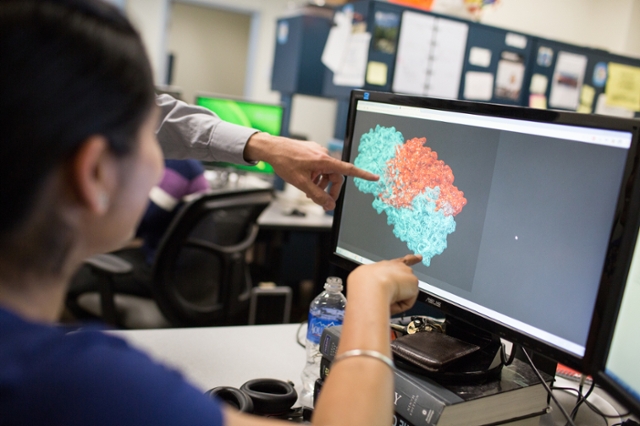Are Providers Prepared for Genomic Medicine?
The ability to analyze our genetics has become commercial at a rapid pace. Companies like 23andMe give consumers the ability to look into personal DNA and discover everything from ancestry to cancer indicators. Armed with this information, who can patients turn to for next steps once they’ve opened Pandora’s box?
- search keywords:
- Bioinformatics
- Biomedical Informatics
- Genetic Testing
- Medicine

“We hear about precision medicine all the time, and how advancements in technology have given us access to human genome data,” Dr. Kiran Bastola, associate professor at IS&T, said. “There’s now a business model out there to capitalize on this data.”
Dr. Scott McGrath, a recent Ph.D. in Biomedical Informatics graduate, knew that when looking for guidance with their genetic data, most people would turn towards a genetic specialist or a general practitioner. Together with Nephi Walton, a pediatrician specializing in clinical genetics at Geisinger, Marc Williams, the director of the Genomic Medicine Institute at Geisinger, Katherine Kim, an assistant professor at U.C. Davis, and Bastola, McGrath set out to answer if these medical professionals were able to accurately decipher genetic testing data for their patients.
The concern was, once this data starts coming in, the limited number of genetic specialists we have will quickly become overwhelmed. Were medical practitioners able to interpret the data if presented with it?
Dr. Scott McGrath, a recent Ph.D. in Biomedical Informatics graduate, knew that when looking for guidance with their genetic data, most people would turn towards a genetic specialist or a general practitioner. Together with Nephi Walton, a pediatrician specializing in clinical genetics at Geisinger, Marc Williams, the director of the Genomic Medicine Institute at Geisinger, Katherine Kim, an assistant professor at U.C. Davis, and Bastola, McGrath set out to answer if these medical professionals were able to accurately decipher genetic testing data for their patients.
“The significance of this study is that it’s the first time we’ve looked at how health professionals and genetic specialists interpret this data, not just the consumer,” McGrath said. In addition to evaluating how medical professionals interpret genetic test results, the research also looked at how comfortable the professionals were with interpreting the data and explaining the data to their patients.
Direct to consumer genetic tests (DTC-GT) like 23andMe are designed to send consumers the results with no medical intervention. As DTC-GT companies become more popular with a wider customer base, it's likely that an influx of patients will go to medical professionals to help them interpret the data.
“The genesis of this project was looking at precision medicine’s goals in bringing in genetic data for patients,” McGrath said. “The concern was, once this data starts coming in, the limited number of genetic specialists we have will quickly become overwhelmed. Were medical practitioners able to interpret the data if presented with it?”
The group found that the rates of correctly interpreting the data was relatively high, with 74.4 percent of providers and 83.4 percent of specialists, indicating that specialists remain the best group to help patience understand their results but that providers are a good option. The research noted that several indicators were associated with higher correct interpretation rates, including level of trust with the reports and prior genetic test consultation experience.
“We want the public to have correct knowledge in interpreting their data,” Bastola said. “Our ultimate goal is to make sure that this powerful knowledge patients are getting out of their genome data is being used to the benefit of healthcare.”
The group’s research, “Are providers prepared for genomic medicine: interpretation of Direct-to-Consumer genetic testing results and genetic self-efficacy by medical professionals,” was published in BMC this late November.
 Dr. Scott McGrath
Dr. Scott McGrath